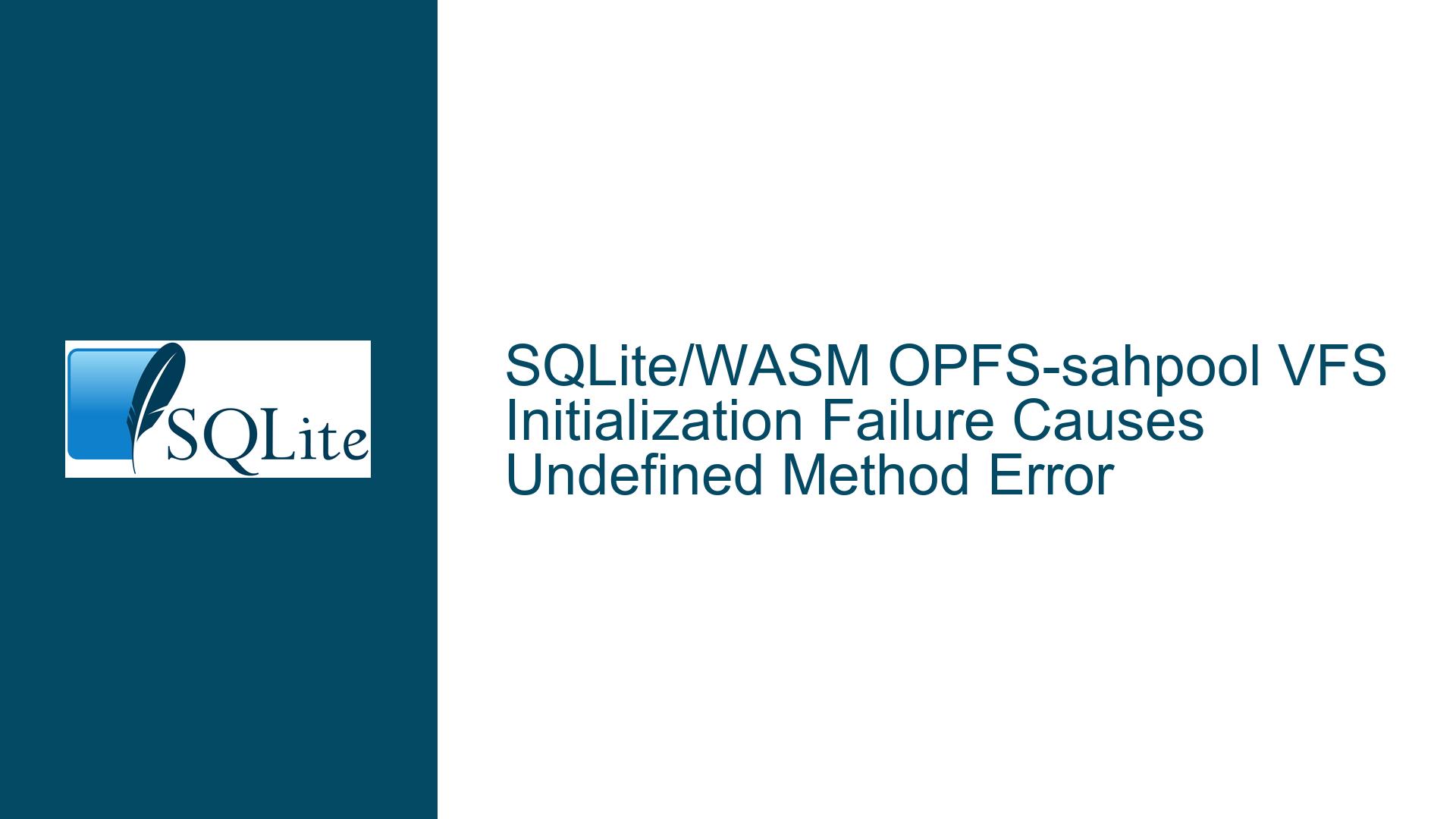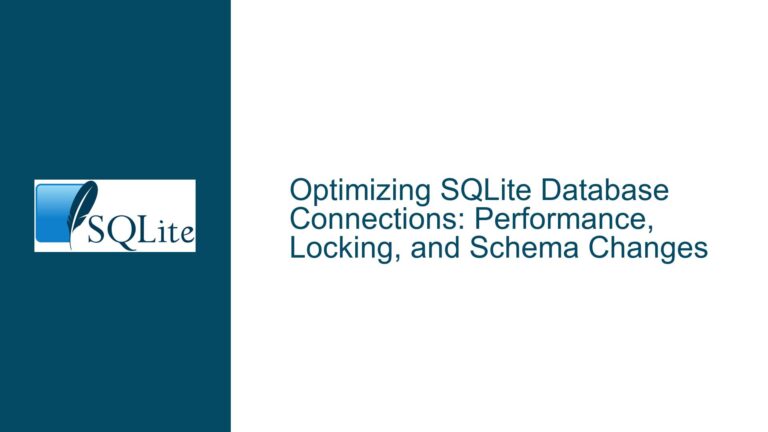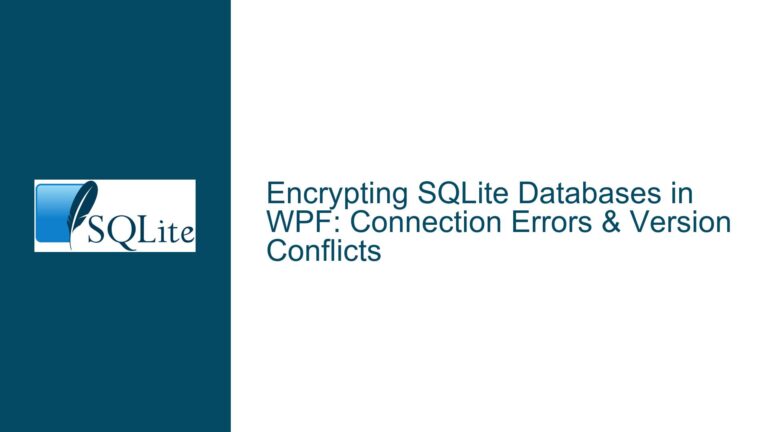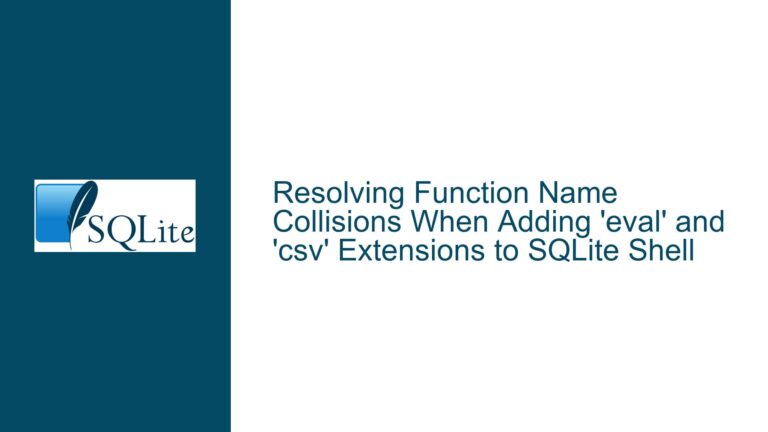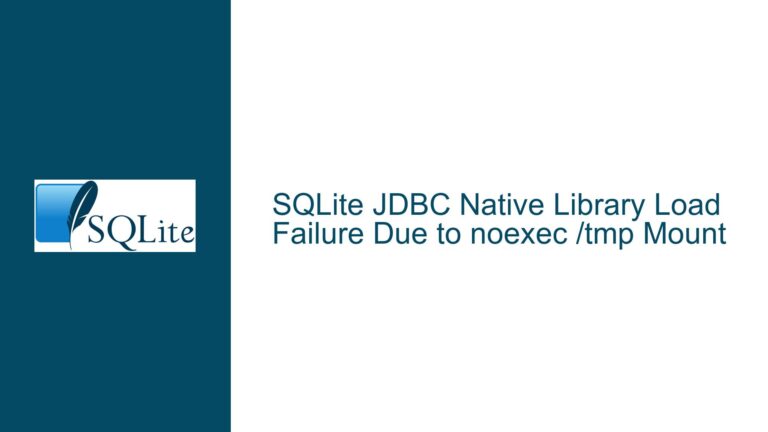SQLite/WASM OPFS-sahpool VFS Initialization Failure Causes Undefined Method Error
OPFS-sahpool VFS Initialization Failure Propagates Invalid Utility Object
Issue Overview: Undefined Function Error During OPFS-sASHPoolUtil Interaction
A critical error manifests when attempting to use the OpfsSAHPoolUtil.getFileNames method in SQLite/WASM with the OPFS-sahpool VFS, resulting in the runtime exception "sahPoolUtil.getFileNames is not a function". This occurs because the sahPoolUtil object reference becomes an error object instead of the expected utility class instance when VFS initialization fails. The root cause lies in error-handling logic within the VFS initialization routine: when initialization throws an exception, the error is caught and returned as a value rather than being rethrown. This leads to the assignment of an error object (instead of a properly initialized OpfsSAHPoolUtil instance) to the sahPoolUtil variable. Consequently, any attempts to invoke methods on this error object trigger "is not a function" errors. This issue is particularly insidious because it transforms what should be a fatal initialization error into a silent failure that corrupts object state, deferring the problem’s visibility until later interaction with the invalid utility object.
The OPFS-sahpool VFS is designed to coordinate synchronous access to the Origin Private File System (OPFS) in web browsers via SharedArrayBuffer (SAH)-based synchronization primitives. Its initialization process involves configuring shared memory buffers and file handles, which require specific browser permissions, security contexts, and API support. When any step in this setup fails—such as missing OPFS APIs, insufficient permissions, or unsupported environments—the VFS initialization routine should propagate the error to the caller. However, due to the error being swallowed and returned as a value, the application proceeds with a broken utility object, creating a time bomb that detonates when methods like getFileNames are called.
This problem has far-reaching implications for applications relying on SQLite/WASM with OPFS-sahpool in production environments. It undermines error recovery strategies, complicates debugging due to deferred failures, and risks data corruption if the application attempts to interact with a partially initialized VFS. The severity is amplified in distributed systems where environment discrepancies (e.g., browser versions, security policies) are common, increasing the likelihood of initialization failures.
Possible Causes: Error Swallowing, Environment Misconfiguration, and Race Conditions
1. Improper Error Handling in VFS Initialization Routine
The primary catalyst for this issue is a flawed error-handling pattern in the OPFS-sahpool VFS initialization code. When the initVfs function encounters an exception during setup (e.g., failure to access OPFS APIs), it catches the error and returns it as a normal return value instead of rethrowing it. This violates the principle that initialization functions should either return a valid object or throw an exception, never returning an error as a value. The calling code then assigns this error object to sahPoolUtil, mistaking it for a valid utility instance. Subsequent method calls on this error object inevitably fail because it lacks the expected methods.
2. Browser or Environment Limitations
The OPFS-sahpool VFS requires specific browser capabilities to function:
- Support for the Origin Private File System API (part of the File System Access API).
- A secure context (HTTPS or localhost) for OPFS access.
- SharedArrayBuffer support, which mandates cross-origin isolation headers (
Cross-Origin-Opener-Policy: same-originandCross-Origin-Embedder-Policy: require-corp). - Recent browser versions (Chromium 86+, Firefox 111+ with flags).
If any of these requirements are unmet, VFS initialization fails. However, without proper error propagation, developers might not realize their environment is misconfigured until runtime errors occur.
3. Race Conditions in Asynchronous Initialization
SQLite/WASM often operates in asynchronous environments where module initialization, VFS setup, and application code execution are interleaved. If the application attempts to use sahPoolUtil before the VFS initialization completes (or fails), it might access a partially initialized or unresolved promise, leading to undefined behavior. While the discussed error specifically involves swallowed exceptions, race conditions can exacerbate the problem by creating timing-dependent failures.
4. Version Mismatches or Build Artifacts
Using outdated or mismatched versions of SQLite/WASM components can lead to silent failures. For example:
- The application might reference a build of
sqlite3-vfs-opfs-sahpool.c-pp.jsthat predates the error-handling fix. - The main SQLite/WASM library (
sqlite3.js) and VFS plugin might be from different commits, causing API incompatibilities. - Build tools might cache old versions of WASM binaries or JavaScript glue code, leading to inconsistent behavior.
Troubleshooting Steps, Solutions & Fixes: Diagnosing and Resolving Initialization Failures
Step 1: Confirm Environment Support for OPFS and SharedArrayBuffer
Action: Validate that the application runs in a browser environment supporting OPFS and SharedArrayBuffer with proper security headers.
Implementation:
- Navigate to
chrome://flags/#enable-experimental-web-platform-featuresin Chromium-based browsers and ensure experimental features are enabled. - Serve the application over HTTPS or localhost.
- Set response headers:
Cross-Origin-Opener-Policy: same-origin Cross-Origin-Embedder-Policy: require-corp - Run feature detection scripts before initializing SQLite:
if (typeof SharedArrayBuffer === 'undefined') { throw new Error("SharedArrayBuffer not supported"); } if (typeof navigator?.storage?.getDirectory === 'undefined') { throw new Error("OPFS not supported"); }
Step 2: Update to Fixed Versions of SQLite/WASM
Action: Ensure the application uses a version of SQLite/WASM with the corrected error-handling logic.
Implementation:
- Use the official SQLite/WASM build from the trunk or version 3.45+.
- Update import statements or script tags to reference the corrected build:
<!-- Before --> <script src="https://example.com/sqlite3-vfs-opfs-sahpool.js"></script> <!-- After --> <script src="https://cdn.jsdelivr.net/npm/@sqlite.org/[email protected]/+esm"></script> - Verify the fix by checking the error-handling lines in
sqlite3-vfs-opfs-sahpool.c-pp.js:// Fixed code should rethrow errors try { initVfs(); } catch (e) { throw e; // Previously returned e }
Step 3: Instrument Initialization Code with Diagnostic Logging
Action: Add logging to trace VFS initialization outcomes and inspect the sahPoolUtil object.
Implementation:
let sahPoolUtil;
try {
sahPoolUtil = await sqlite3.opfs.installSAHPoolVfs();
console.log("VFS initialized:", sahPoolUtil);
} catch (e) {
console.error("VFS initialization failed:", e);
throw e;
}
// Before using getFileNames
if (typeof sahPoolUtil?.getFileNames !== 'function') {
throw new Error("sahPoolUtil not initialized properly");
}
Step 4: Implement Defensive Checks for Utility Object Validity
Action: Add runtime type checks before interacting with sahPoolUtil methods.
Implementation:
function getOpfsFileNames() {
if (!sahPoolUtil || typeof sahPoolUtil.getFileNames !== 'function') {
throw new Error("sahPoolUtil not initialized");
}
return sahPoolUtil.getFileNames();
}
Step 5: Refactor Asynchronous Initialization Flows
Action: Ensure VFS initialization completes before accessing its methods.
Implementation:
async function initSqlite() {
const sqlite3 = await self.sqlite3.initSqlite3();
try {
sahPoolUtil = await sqlite3.opfs.installSAHPoolVfs();
} catch (e) {
console.error("Failed to initialize OPFS-sahpool VFS:", e);
sahPoolUtil = null;
throw e;
}
return sqlite3;
}
// Usage
initSqlite().then(() => {
console.log("File names:", sahPoolUtil.getFileNames());
});
Step 6: Handle Cross-Origin Isolation Requirements
Action: Configure web server and application architecture to meet security prerequisites for SharedArrayBuffer.
Implementation:
- Apache Configuration:
Header set Cross-Origin-Opener-Policy "same-origin" Header set Cross-Origin-Embedder-Policy "require-corp" - Webpack DevServer:
devServer: { headers: { "Cross-Origin-Opener-Policy": "same-origin", "Cross-Origin-Embedder-Policy": "require-corp" } }
Step 7: Test Across Browser Versions and Platforms
Action: Identify environment-specific limitations by testing on multiple browsers.
Implementation:
- Chromium 86+: Full support with default flags.
- Firefox 111+: Enable
dom.workers.serialized-sab-accessandjavascript.options.shared_memoryinabout:config. - Safari: No OPFS support as of 2024; use polyfills or fallback storage.
Step 8: Audit Build Chains and Dependency Versions
Action: Ensure all SQLite/WASM components are synchronized.
Implementation:
- Use npm/yarn resolutions to enforce specific versions:
{ "resolutions": { "@sqlite.org/sqlite-wasm": "3.45.1" } } - Purge build caches and redeploy to eliminate stale artifacts.
Step 9: Implement Fallback Storage Mechanisms
Action: Degrade gracefully when OPFS-sahpool isn’t available.
Implementation:
async function initVfs() {
try {
return await sqlite3.opfs.installSAHPoolVfs();
} catch (e) {
console.warn("OPFS-sahpool unavailable; falling back to memory VFS.");
return sqlite3.installMemoryVfs();
}
}
Step 10: Monitor and Alert on Initialization Failures
Action: Integrate telemetry to capture VFS initialization errors in production.
Implementation:
try {
sahPoolUtil = await initVfs();
} catch (e) {
telemetry.reportError("vfs_init_failure", e);
throw e;
}
By methodically addressing each potential cause—from error-handling flaws in the VFS code to environmental misconfigurations—developers can eradicate the "sahPoolUtil.getFileNames is not a function" error and build resilient SQLite/WASM applications. The key is combining rigorous error propagation, defensive programming practices, and thorough environment validation to ensure the OPFS-sahpool VFS initializes correctly or fails visibly before application logic proceeds.
